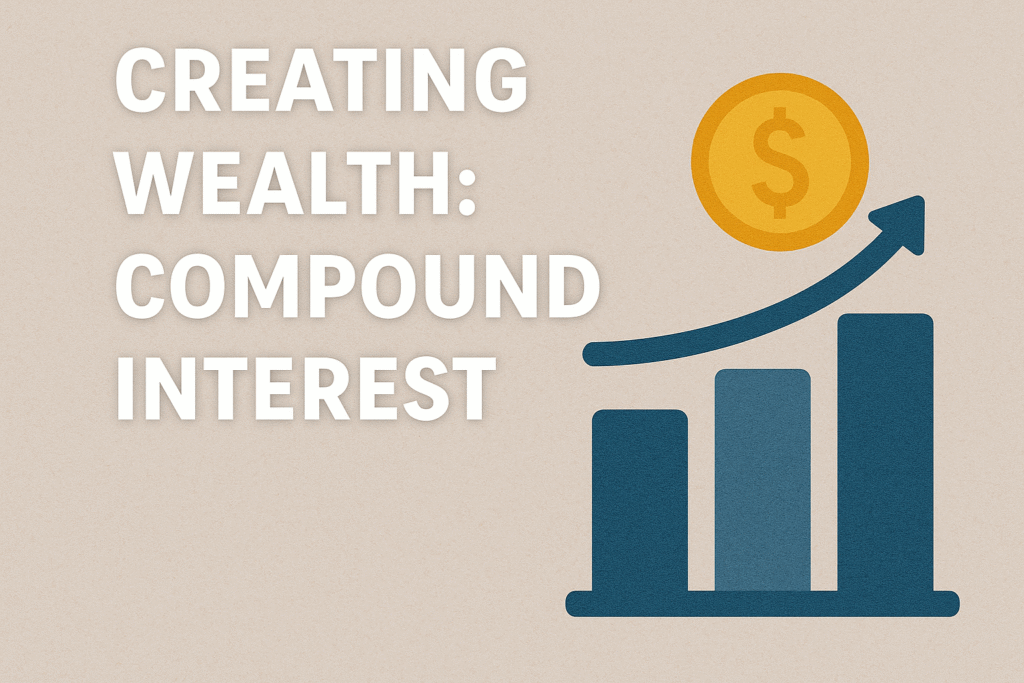Introduction:
Why Compound Interest Is Called the “Eighth Wonder”
Albert Einstein said compound interest was the “eighth wonder of the world,” and for good reason. Compound interest is the financial mechanism that will allow you to grow your money exponentially over time. Instead of just earning interest on your initial investment (principal), you earn interest on the interest that has already accrued. This is the snowball effect in action. Grasping this concept and using it to your advantage is one of the best ways to create long-term wealth.
In this complete guide, we will show you how compound interest works, why it is indispensable when building wealth, and tips for utilizing its force to gain financial independence.

H1: What is Compound Interest
The Basics
Compound interest is where “interest is added to the principal and then interest for later periods is computed on the principal plus previously accumulated interest. In other words, you earn interest not only on your investment but the interest from previous periods.”
Formula:
Future Value = Principal × (1 + Rate)^Time
Where:
Principal = The amount of money you initially invested or saved
Rate = The interest rate per year (expressed as a decimal)
Time = The number of compounding periods
Simple Interest vs. Compound Interest
Simple Interest: interest earned only on the principal amount. If we take an example, a $10,000 deposit at 5% simple interest for 10 years will yield $5,000 total interest.
Compound interest: interest earned on the principal and additional interest. If we take the same example and assume 5% compound interest compounded annually for 10 years, the $10,000 investment will grow to greater than $16,000.
This difference demonstrates why compound interest grows faster than simple interest over time.
H1: The Math Behind Wealth Growth
The Rule of 72
The Rule of 72 is a simple method to estimate how long it will take for your money to double. You divide 72 by your annual interest rate.
Example: if the annual return is 8%, it will take approximately 9 years for the money to double (72 ÷ 8).
H3: Compounding Frequency
Interest can be compounded annually, quarterly, monthly or even daily. The more compounding periods, the faster the growth of your wealth.
Annually means the interest is added once per year.
Monthly means the interest is added 12 times in a one-year period, yielding slightly more returns.
H1: Why Time is Your Biggest Friend
H2: Starting Early (vs.) Starting Late
Time is the most important consideration when unleashing compound interest. Consider the example of two investors:
Investor A invests $5,000 annually from age 25 to 35 (10 years) and then doesn’t invest anymore.
Investor B invests $5,000 annually from age 35 to 65 (30 years).
If both earned an 8% return annually, by age 65, Investor A would have more money, even though Investor A invested for a shorter duration. Time gave compound interest the chance to perform.
What Does it Cost When You Wait?
Every year that you wait to invest, you will be sacrificing the impact of compounding returns. Waiting just 5 years can cost you hundreds of thousands at retirement.
H1: Real Ways to Exploit Compound Interest
Start Investing Early
The earlier you start, the more time you give for your investments to compound. Even a few dollars on a regular basis can compound for significant wealth.
H2: Automate Your Savings and Investments
Set up automatic transfers to your savings or investment accounts. Automation enables you to consistently invest and helps you avoid the temptation to spend.
Reinvest Your Earnings
Whenever possible, reinvest dividends and interest to avoid cashing out. By reinvesting you will have compounding working for you much faster.
Diversify Your Portfolio
A diversified portfolio of stocks, bonds, and index funds can help manage risk and maximize long-term growth.
H3: Tax-Advantaged Accounts
401(k): Employer matching contributions to 401(k)s are just free money that compounds while you invest for retirement.
IRA/Roth IRA: Tax-benefiting accounts that will help with compounding over the next few decades.
H1: Compounding Interest In Real-Life
H2: Savings Account & Certificate of Deposit (CD)
High-yield savings accounts and CDs help with steady low-risk increases in value with compound interest.
H2: Stock Market (Index Fund & ETFs)
If you can invest in index funds or ETFs that have compounded at a historical average of 7-10% a year, it is amazing how fast you can compound wealth.
Real Estate / Business
Rental income and business profits that you can reinvest compound growth that is separate from stock market investments.
H1: The Reverse Effect – Compounding Debt
H2: Credit Card Debt
When you have high-interest debt, like a credit card with a 20% APR compounding every month, you are working against compound interest. It can add up quickly.
H3: Student Loans & Other Debt
If you have high-interest debt, limit or eliminate it quickly, otherwise the reverse effect will compound the debt and deplete your pocketbook.
H1: Long-Term Perspective for Financial Freedom
H2: Patience and Consistency
Compound interest favors those that stay calm and stick to the plan. Feeling the urge to sell and get out of the market during market drops and short-term panic, is the main barrier to long-term compounding.
H3: Annually Review and Adjust
At least annually review your portfolio to ensure it continues to match your risk tolerance and overall financial objectives.
Summary
Start Early: Time is the most significant ingredient in compounding.
Invest Consistently: Even small and consistent contributions add up.
Reinvest: Reinvest all earnings to maximize compound interest growth.
Avoid High-Interest Debt: The negative effects of compounding can prevent the accumulation of wealth.
Conclusion:
YOUR Path to Wealth
Compound interest makes it easier to turn small investments into significant wealth. By starting early, making consistent investments, and allowing time and compounding to work in your favor, you give yourself the best chance at financial freedom and perpetual success. Whether it is in your retirement accounts, stock market investments, or other sources of passive income, compound interest will help you accomplish your financial goals.
